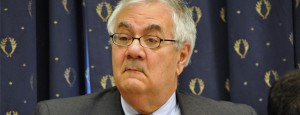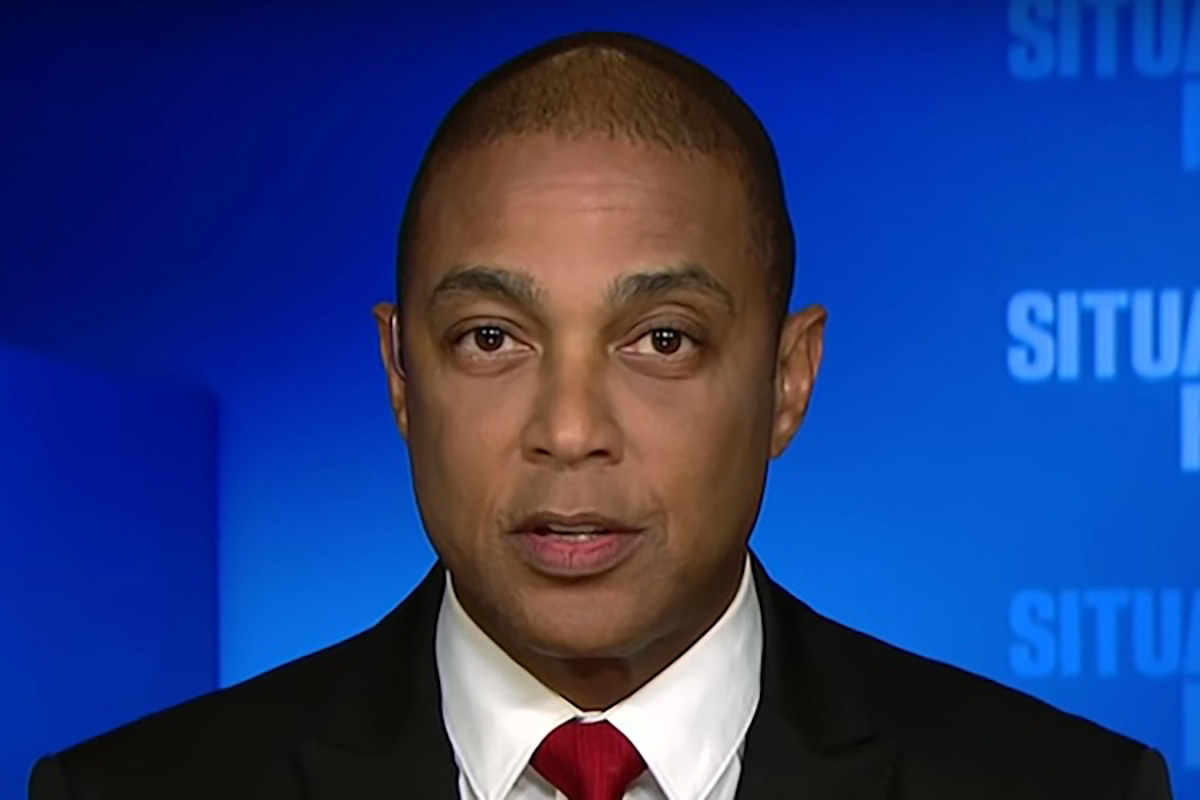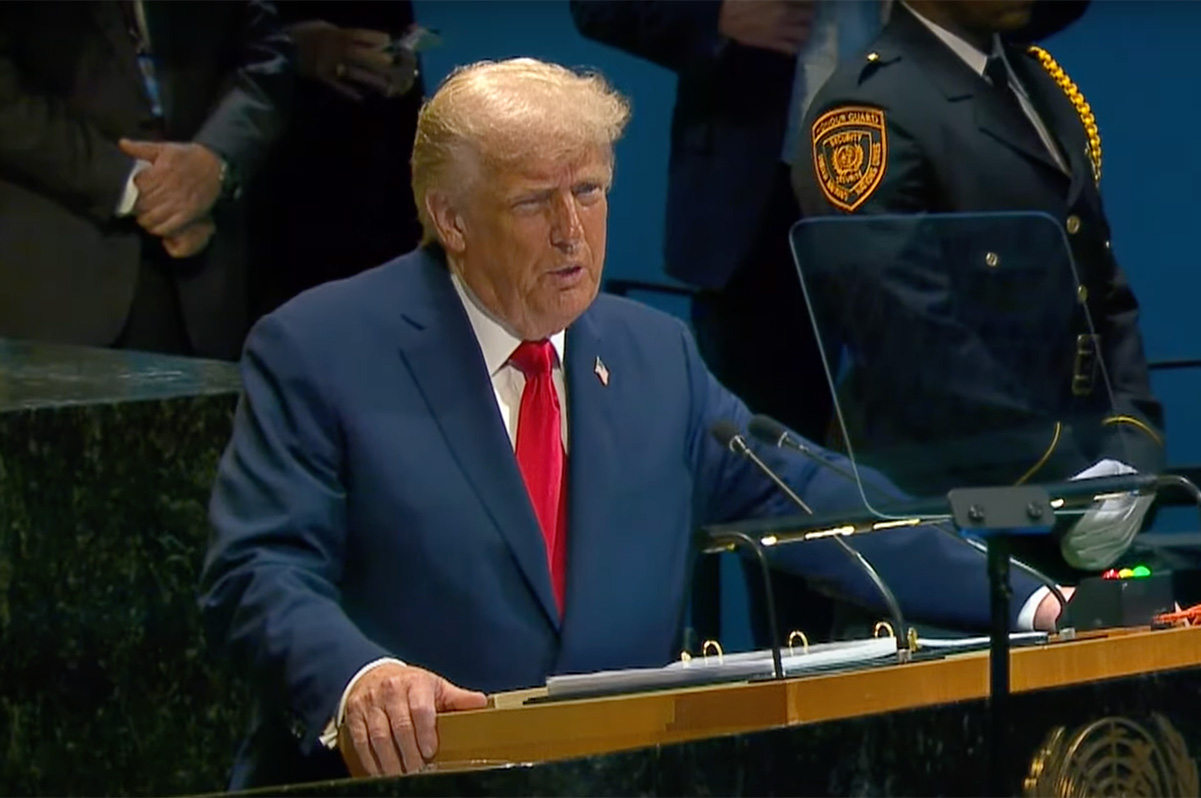National
Has the gay agenda been shelved?
Further action on LGBT bills looking less likely this Congress

On the long-stalled Employment Non-Discrimination Act, U.S. Rep. Barney Frank said ‘we’re still trying to figure out a way to get that done.’ (Washington Blade photo by Michael Key)
The limited time remaining in the legislative calendar for this Congress is raising questions about whether lawmakers will pass any further pro-LGBT bills before year’s end — and whether it will be politically feasible to pass such bills next year.
Congress advanced LGBT-related legislation last year when it passed hate crimes protections. This year, a measure that would lead to repeal of “Don’t Ask, Don’t Tell” seems likely to reach President Obama’s desk.
Still, some LGBT activists and voters are frustrated that Congress has taken no action to advance the Employment Non-Discrimination Act. Supporters of the legislation have said several times a vote was imminent, but no such action has yet been taken.
Other pending measures include the Domestic Partnership Benefits & Obligations Act, which would allow LGBT federal workers to receive spousal benefits for their same-sex partners, as well as the Uniting American Families Act and repeal of the Defense of Marriage Act.
Further complicating the situation is the specter of reduced Democratic majorities in the next Congress — or even a Republican takeover — and whether measures unaddressed this year would be viable in 2011.
Despite the limited time remaining this year, some LGBT rights supporters are hopeful that Congress will move forward with additional legislation. U.S. Rep. Barney Frank (D-Mass.), a gay lawmaker and House sponsor of ENDA, expressed optimism about the bill passing the House this year.
“That’s going to be next thing we’ll turn our attention to,” Frank said. “We have the speaker’s support and we’re still trying to figure out a way to get that done.”
The scheduling for a House vote on ENDA remains an issue. House Speaker Nancy Pelosi earlier told the Blade that a House vote on ENDA wouldn’t occur until Congress finishes legislative action on “Don’t Ask, Don’t Tell.”
Drew Hammill, a Pelosi spokesperson, said ENDA remains “a top priority for the speaker,” but a vote on the bill before work on “Don’t Ask, Don’t Tell” is complete “jeopardizes both initiatives.”
“Until then, we should encourage the Senate to develop a course for ENDA to ensure that when the House passes the legislation, the Senate can move quickly to send the legislation to the president’s desk,” Hammill said.
Frank said efforts toward repealing “Don’t Ask, Don’t Tell” displaced ENDA in the batting order for Congress because the fiscal year 2011 defense authorization bill came to lawmakers before a vote could happen on ENDA.
“If the defense authorization hadn’t come up earlier, we might have been able to do ENDA first,” he said.
Frank noted that he thinks the votes exist in the House to pass a trans-inclusive ENDA, but he wouldn’t give a timetable for when the legislation would move forward in Congress because he didn’t want to tip off opponents of the bill.
Michael Cole, a Human Rights Campaign spokesperson, said a House vote on ENDA is among the pro-LGBT items his organization has pressed for in the time remaining in this year’s legislative calendar.
“We’re certainly interested in seeing the House take a vote on ENDA,” Cole said. “We’ve been advocating for that for a long time, and as recess comes, we’ll be doing a lot of work to make sure our members are getting in touch with members of Congress to push for a vote on it.”
But if the House manages to pass ENDA this year, getting the legislation through the Senate remains a significant challenge. Sources have said 60 votes are lacking in the Senate to overcome a filibuster on the legislation. Also, because the Senate allows non-germane amendments, opponents of the bill could attach additional measures in an attempt to block its passage.
Still, Frank said he believes passage of ENDA in the Senate remains a possibility.
“If you ask them if they think they can pass it, they’ll say ‘no,’ so the important thing to do is for us [in the House] to try [to] pass it and send it over there, so they can’t just avoid it,” Frank said.
Activists also foresee a possibility of passing the Domestic Partnership Benefits & Obligations Act before year’s end.
Cole said the legislation, as well as the Tax Equity for Health Plan Beneficiaries Act, which would eliminate the tax penalty paid on employer-provided health insurance for domestic partners, could be made part of upcoming omnibus authorization or appropriations bills.
“We’re following what the plans appear to be on the Hill to see how we might be able to get those pieces of legislation [advanced] as part of them,” Cole said.
Frank also acknowledged the possibility of passing the Domestic Partnership Benefits & Obligations Act and said that legislation is “in serious conversation.”
Still, Frank noted the bill comes with a price tag — estimated at one time by the U.S. Office of Personnel Management to be $56 million a year — and that concerns associated with raising the federal deficit may cause problems in passing the bill.
Frank said finding a way to offset the legislation’s cost remains an issue for the Domestic Partnership Benefits & Obligations Act and “we have to find a way to pay for that.”
Whatever progress this Congress makes on passing pro-LGBT bills, recent polls are casting doubts on whether enough Democratic lawmakers will retain their seats next Congress to pass such bills.
Several recent polls have shown considerable opposition toward Democrats and the Obama administration as persistent unemployment and concerns about government spending linger across the country.
White House Press Secretary Robert Gibbs gained media attention and inspired consternation among Democratic House members when, during an appearance earlier this month on NBC’s “Meet the Press,” he said Republicans could regain control of the House.
“I think people are going to have a choice to make in the fall,” Gibbs said. “But I think there’s no doubt there are enough seats in play that could cause Republicans to gain control. There’s no doubt about that.”
Larry Sabato, a political scientist at the University of Virginia, is projecting that Republicans will win seven seats in the Senate and 32 seats in House after the election.
Because of this potential shift, Sabato said passage of more pro-LGBT bills next Congress is unlikely if it doesn’t happen this year.
“If these pieces of legislation don’t pass now, when both houses have swollen Democratic majorities, they certainly aren’t going to pass in the next Congress, when Democrats will have narrow majorities, or even be in the minority,” Sabato said.
Sabato said the loss of a half-dozen Democratic seats in the Senate could be enough to “kill these bills” entirely in the next Congress because proponents wouldn’t be able to find 60 votes to thwart a filibuster.
But Frank said the possibility of passing more pro-LGBT legislation in a future Congress is unknown because the fallout of the November elections is yet to be seen.
“I don’t think there’s any question there will be Republican gains in both chambers,” he said. “But what kind of gains? How much? Three senators? Eight senators? Fifteen representatives? Thirty-five representatives?”
Frank also said some members of Congress that would lose in the upcoming election wouldn’t “be supportive of ENDA anyway.”
Additionally, he said Congress could more easily take up other pro-LGBT bills in the future after items like hate crimes and “Don’t Ask, Don’t Tell” are off the table.
“To some extent, the more you have to work on, the harder it is to do any one of them,” he said.
Cole said although no one knows what the future holds for support for pro-LGBT legislation after year’s end, he noted several supportive incumbents are in danger of losing their seats.
“The thing to keep in mind, though, is cobbling together a pro-LGBT majority for any piece of legislation has never been a slam dunk,” Cole said. “It’s not necessarily about party affiliation — it’s about people who have taken stances toward equality measures.”
Florida
AIDS Healthcare Foundation sues Fla. over ‘illegal’ HIV drug program cuts
Tens of thousands could lose access to medications

Following the slashing of hundreds of thousands of dollars from Florida’s AIDS Drug Assistance Program, AIDS Healthcare Foundation filed a lawsuit against the Florida Department of Health over what it says was an illegal change to income eligibility thresholds for the lifesaving program.
The Florida Department of Health announced two weeks ago that it would make sweeping cuts to ADAP, dramatically changing how many Floridians qualify for the state-funded medical coverage — without using the formal process required to change eligibility rules. As a result, AHF filed a petition Tuesday in Tallahassee with the state’s Division of Administrative Hearings, seeking to prevent more than 16,000 Floridians from losing coverage.
The medications covered by ADAP work by suppressing HIV-positive people’s viral load — making the virus undetectable in blood tests and unable to be transmitted to others.
Prior to the eligibility change, the Florida Department of Health covered Floridians earning up to 400 percent of the federal poverty level — or $62,600 annually for an individual. Under the new policy, eligibility would be limited to those making no more than 130 percent of the federal poverty level, or $20,345 per year.
The National Alliance of State and Territorial AIDS Directors estimates that more than 16,000 patients in Florida will lose coverage under the state’s ADAP because of this illegal change in department policy. Florida’s eligibility changes would also eliminate access to biktarvy, a widely used once-daily medication for people living with HIV/AIDS.
Under Florida law, when a state agency seeks to make a major policy change, it must either follow a formal rule-making process under the Florida Administrative Procedure Act or obtain direct legislative authorization.
AHF alleges the Florida Department of Health did neither.
Typically, altering eligibility for a statewide program requires either legislative action or adherence to a multistep rule-making process, including: publishing a Notice of Proposed Rule; providing a statement of estimated regulatory costs; allowing public comment; holding hearings if requested; responding to challenges; and formally adopting the rule. According to AHF, none of these steps occurred.
“Rule-making is not a matter of agency discretion. Each statement that an agency like the Department of Health issues that meets the statutory definition of a rule must be adopted through legally mandated rule-making procedures. Florida has simply not done so here,” said Tom Myers, AHF’s chief of public affairs and general counsel. “The whole point of having to follow procedures and rules is to make sure any decisions made are deliberate, thought through, and minimize harm. Floridians living with HIV and the general public’s health are at stake here and jeopardized by these arbitrary and unlawful DOH rule changes.”
AHF has multiple Ryan White CARE Act contracts in Florida, including four under Part B, which covers ADAP. More than 50 percent of people diagnosed with HIV receive assistance from Ryan White programs annually.
According to an AHF advocacy leader who spoke with the Washington Blade, the move appears to have originated at the state level rather than being driven by the federal government — a claim that has circulated among some Democratic officials.
“As far as we can tell, Congress flat-funded the Ryan White and ADAP programs, and the proposed federal cuts were ignored,” the advocacy leader told the Blade on the condition of anonymity. “None of this appears to be coming from Washington — this was initiated in Florida. What we’re trying to understand is why the state is claiming a $120 million shortfall when the program already receives significant federal funding. That lack of transparency is deeply concerning.”
Florida had the third-highest rate of new HIV infections in the nation in 2022, accounting for 11 percent of new diagnoses nationwide, according to KFF, a nonprofit health policy research organization.
During a press conference on Wednesday, multiple AHF officials commented on the situation, and emphasized the need to use proper methods to change something as important as HIV/AIDS coverage availability in the sunshine state.
“We are receiving dozens, hundreds of calls from patients who are terrified, who are confused, who are full of anxiety and fear,” said Esteban Wood, director of advocacy, legislative affairs, and community engagement at AHF. “These are working Floridians — 16,000 people — receiving letters saying they have weeks left of medication that keeps them alive and costs upwards of $45,000 a year. Patients are asking us, ‘What are we supposed to do? How are we supposed to survive?’ And right now, we don’t have a good answer.”
“This decision was not done in the correct manner. County health programs, community-based organizations, providers across the state — none of them were consulted,” Wood added. “Today is Jan. 28, and we have just 32 days until these proposed changes take effect. Nearly half of the 36,000 people currently on ADAP could be disenrolled in just over a month.”
“Without this medication, people with HIV get sicker,” Myers said during the conference. “They end up in emergency rooms, they lose time at work, and they’re unable to take care of their families. Treatment adherence is also the best way to prevent new HIV infections — people who are consistently on these medications are non-infectious. If these cuts go through, you will have sicker people, more HIV infections, and ultimately much higher costs for the state.”
“Patients receiving care through Ryan White and ADAP have a 91 percent viral suppression rate, compared to about 60 percent nationally,” the advocacy leader added. “That’s as close to a functional cure as we can get, and it allows people to live healthy lives, work, and contribute to their communities. Blowing a hole in a program this successful puts lives at risk and sets a dangerous precedent. If Florida gets away with this, other states facing budget pressure could follow.”
The lawsuit comes days after the Save HIV Funding campaign pressed Congress to build bipartisan support for critical funding for people living with or vulnerable to HIV. In May of last year, President Donald Trump appeared to walk back his 2019 pledge to end HIV as an epidemic, instead proposing the elimination of HIV prevention programs at the Centers for Disease Control and Prevention and housing services in his budget request to Congress.
House appropriators, led by the Republican majority, went further, calling for an additional $2 billion in cuts — including $525 million for medical care and support services for people living with HIV.
While Senate appropriators ultimately chose to maintain level funding in their version of the spending bills, advocates feared final negotiations could result in steep cuts that would reduce services, increase new HIV infections, and lead to more AIDS-related deaths. The final spending package reflected a best-case outcome, with funding levels largely mirroring the Senate’s proposed FY26 allocations.
“What the state has done in unilaterally announcing these changes is not following its own rules,” Myers added. “There is a required process — rule-making, notice and comment, taking evidence — and none of that happened here. Before you cut 16,000 people off from lifesaving medication, you have to study the harms, ask whether you even have the authority to do it, and explore other solutions. That’s what this lawsuit is about.”
National
Federal authorities arrest Don Lemon
Former CNN anchor taken into custody two weeks after Minn. church protest

Federal authorities on Thursday arrested former CNN anchor Don Lemon in Los Angeles.
CNN reported authorities arrested Lemon after 11 p.m. PT while in the lobby of a hotel in Beverly Hills, Calif., while he “was leaving for an event.” Lemon’s lawyer, Abbe Lowell, in a statement said his client was in Los Angeles to cover the Grammy Awards.
Authorities arrested Lemon less than two weeks after he entered Cities Church in St. Paul, Minn., with a group of protesters who confronted a pastor who works for U.S. Immigration and Customs Enforcement. (An ICE agent on Jan. 7 shot and killed Renee Good, a 37-year-old Minneapolis woman who left behind her wife and three children. U.S. Customs and Border Protection agents on Jan. 24 shot and killed Alex Pretti, a 37-year-old nurse who worked for the Department of Veterans Affairs, in Minneapolis.)
Lemon insists he was simply covering the Cities Church protest that interrupted the service. A federal magistrate last week declined to charge the openly gay journalist in connection with the demonstration.
“Don Lemon was taken into custody by federal agents last night in Los Angeles, where he was covering the Grammy awards,” said Lowell in his statement. “Don has been a journalist for 30 years, and his constitutionally protected work in Minneapolis was no different than what he has always done. The First Amendment exists to protect journalists whose role it is to shine light on the truth and hold those in power accountable.”
“Instead of investigating the federal agents who killed two peaceful Minnesota protesters, the Trump Justice Department is devoting its time, attention and resources to this arrest, and that is the real indictment of wrongdoing in this case,” Lowell added. “This unprecedented attack on the First Amendment and transparent attempt to distract attention from the many crises facing this administration will not stand. Don will fight these charges vigorously and thoroughly in court.”
Attorney General Pam Bondi on X confirmed federal agents “at my direction” arrested Lemon and three others — Trahern Jeen Crews, Georgia Fort, and Jamael Lydell Lundy — “in connection with the coordinated attack on Cities Church in St. Paul, Minnesota.”
Fort is also a journalist.
At my direction, early this morning federal agents arrested Don Lemon, Trahern Jeen Crews, Georgia Fort, and Jamael Lydell Lundy, in connection with the coordinated attack on Cities Church in St. Paul, Minnesota.
More details soon.
— Attorney General Pamela Bondi (@AGPamBondi) January 30, 2026
Lemon, who CNN fired in 2023, is expected to appear in court in Los Angeles on Friday.
“Freedom of the press is a cornerstone of a free society; it is the tool by which Americans access the truth and hold power to account. But Donald Trump and Pam Bondi are at war with that freedom — and are threatening the fundamentals of our democracy,” said Human Rights Campaign President Kelley Robinson on Friday in a statement. “Don Lemon and Georgia Fort were doing their jobs as reporters. Arresting them is not law enforcement it is an attack on the Constitution at a moment when truthful reporting on government power has never been more important. These are the actions of a despot, the tactics of a dictator in an authoritarian regime.”
The White House
Expanded global gag rule to ban US foreign aid to groups that promote ‘gender ideology’
Activists, officials say new regulation will limit access to gender-affirming care

The Trump-Vance administration has announced it will expand the global gag rule to ban U.S. foreign aid for groups that promote “gender ideology.”
Deputy Secretary of State Christopher Landau in a memo, titled Combating Gender Ideology in Foreign Assistance, the Federal Register published on Jan. 27 notes “previous administrations … used” U.S. foreign assistance “to fund the denial of the biological reality of sex, promoting a radical ideology that permits men to self-identify as women, indoctrinate children with radical gender ideology, and allow men to gain access to intimate single-sex spaces and activities designed for women.”
“Efforts to eradicate the biological reality of sex fundamentally attack women by depriving them of their dignity, safety, and well-being. It also threatens the wellbeing of children by encouraging them to undergo life-altering surgical and chemical interventions that carry serious risks of lifelong harms like infertility,” reads the memo. “The erasure of sex in language and policy has a corrosive impact not just on women and children but, as an attack on truth and human nature, it harms every nation. It is the purpose of this rule to prohibit the use of foreign assistance to support radical gender ideology, including by ending support for international organizations and multilateral organizations that pressure nations to embrace radical gender ideology, or otherwise promote gender ideology.”
President Donald Trump on Jan. 28, 2025, issued an executive order — Protecting Children from Chemical and Surgical Mutilation — that banned federal funding for gender-affirming care for minors.
President Ronald Reagan in 1985 implemented the global gag rule, also known as the “Mexico City” policy, which bans U.S. foreign aid for groups that support abortion and/or offer abortion-related services.
Trump reinstated the rule during his first administration. The White House this week expanded the ban to include groups that support gender-affirming care and diversity, equity, and inclusion programs.
The expanded global gag rule will take effect on Feb. 26.
“None of the funds made available by this act or any other Act may be made available in contravention of Executive Order 14187, relating to Protecting Children From Chemical and Surgical Mutilation, or shall be used or transferred to another federal agency, board, or commission to fund any domestic or international non-governmental organization or any other program, organization, or association coordinated or operated by such non-governmental organization that either offers counseling regarding sex change surgeries, promotes sex change surgeries for any reason as an option, conducts or subsidizes sex change surgeries, promotes the use of medications or other substances to halt the onset of puberty or sexual development of minors, or otherwise promotes transgenderism,” wrote Landau in his memo.
Landau wrote the State Department “does not believe taxpayer dollars should support sex-rejecting procedures, directly or indirectly for individuals of any age.”
“A person’s body (including its organs, organ systems, and processes natural to human development like puberty) are either healthy or unhealthy based on whether they are operating according to their biological functions,” reads his memo. “Organs or organ systems do not become unhealthy simply because the individual may experience psychological distress relating to his or her sexed body. For this reason, removing a patient’s breasts as a treatment for breast cancer is fundamentally different from performing the same procedure solely to alleviate mental distress arising from gender dysphoria. The former procedure aims to restore bodily health and to remove cancerous tissue. In contrast, removing healthy breasts or interrupting normally occurring puberty to ‘affirm’ one’s ‘gender identity’ involves the intentional destruction of healthy biological functions.”
Landau added there “is also lack of clarity about what sex-rejecting procedures’ fundamental aims are, unlike the broad consensus about the purpose of medical treatments for conditions like appendicitis, diabetes, or severe depression.”
“These procedures lack strong evidentiary foundations, and our understanding of long-term health impacts is limited and needs to be better understood,” he wrote. “Imposing restrictions, as this rule proposes, on sex-rejecting procedures for individuals of any age is necessary for the (State) Department to protect taxpayer dollars from abuse in support of radical ideological aims.”
Landau added the State Department “has determined that applying this rule to non-military foreign assistance broadly is necessary to ensure that its foreign assistance programs do not support foreign NGOs and IOs (international organizations) that promote gender ideology, and U.S. NGOs that provide sex-rejecting procedures, and to ensure the integrity of programs such as humanitarian assistance, gender-related programs, and more, do not promote gender ideology.”
“This rule will also allow for more foreign assistance funds to support organizations that promote biological truth in their foreign assistance programs and help the (State) Department to establish new partnerships,” he wrote.
The full memo can be found here.
Council for Global Equality Senior Policy Fellow Beirne Roose-Snyder on Wednesday said the expansion of the so-called global gag rule will “absolutely impact HIV services where we know we need to target services, to that there are non-stigmatizing, safe spaces for people to talk through all of their medical needs, and being trans is really important to be able to disclose to your health care provider so that you can get ARVs, so you can get PrEP in the right ways.” Roose-Snyder added the expanded ban will also impact access to gender-affirming health care, food assistance programs and humanitarian aid around the world.
“This rule is not about gender-affirming care at all,” she said during a virtual press conference the Universal Access Project organized.
“It is about really saying that if you want to take U.S. funds — and it’s certainly not about gender-affirming care for children — it is if you want to take U.S. funds, you cannot have programs or materials or offer counseling or referrals to people who may be struggling with their gender identity,” added Roose-Snyder. “You cannot advocate to maintain your country’s own nondiscrimination laws around gender identity. It is the first place that we’ve ever seen the U.S. government define gender-affirming care, except they call it something a lot different than that.”
The Congressional Equality Caucus, the Democratic Women’s Caucus, the Congressional Hispanic Caucus, the Congressional Asian and Pacific American Caucus, and the Congressional Black Caucus also condemned the global gag rule’s expansion.
“We strongly condemn this weaponization of U.S. foreign assistance to undermine human rights and global health,” said the caucuses in a statement. “We will not rest until we ensure that our foreign aid dollars can never be used as a weapon against women, people of color, or LGBTQI+ people ever again.”
-

 LGBTQ Non-Profit Organizations5 days ago
LGBTQ Non-Profit Organizations5 days agoTask Force urges renewed organizing amid growing political threats
-

 Russia5 days ago
Russia5 days agoRussia designates ILGA World an ‘undesirable’ group
-

 Federal Government4 days ago
Federal Government4 days agoTop Democrats reintroduce bill to investigate discrimination against LGBTQ military members
-

 Virginia4 days ago
Virginia4 days agoFrom the Pentagon to politics, Bree Fram fighting for LGBTQ rights




















